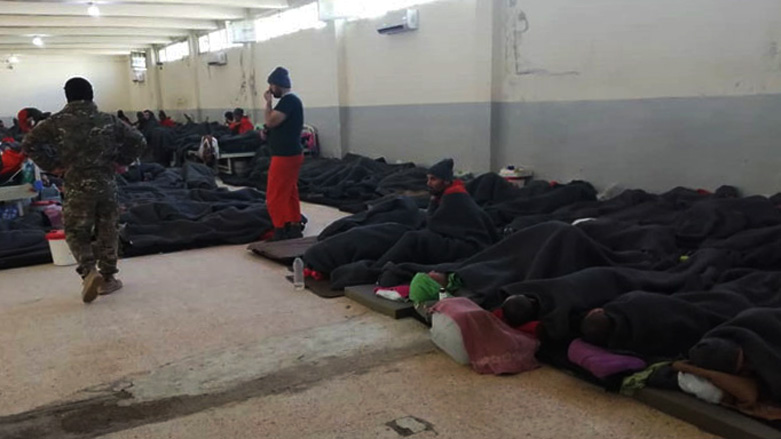ISIS detainees attempt second jailbreak at SDF-held prison in northeast Syria
Suspected Islamic State detainees at a prison in northeastern Syria's city of Hasakah staged a second major break-out attempt on Saturday evening.

ERBIL (Kurdistan 24) – Suspected Islamic State detainees at a prison in the northeast Syrian city of Hasakah staged a second major jailbreak attempt on Saturday evening. The Kurdish-led Syrian Democratic Forces (SDF), which provides security for the region, announced a day later that the situation was under control.
The incident occurred "inside one of the largest prisons in which ISIS terrorists are held in al-Hasakah Governorate," SDF spokesperson Kino Gabriel said Sunday. Members of the extremist group staged "large-scale disobedience" inside the facility, managing to fully control its interior "after they removed the dormitory and corridors doors."
The authorities deployed counter-terrorist and special forces to contain the situation, Gabriel said. He noted further that the day-long affair ended after negotiations between SDF representatives and the detainees who were causing the disturbance and held on terrorism-related charges.
The US-led anti-Islamic State Coalition provided air cover as the event unfolded.
Speaking to Kurdistan 24, Coalition spokesperson Col. Myles B. Caggins III said, "Coalition helicopters orbited the detention facility, keeping watch in case any detainees escaped."
According to the Syria-based Rojava Information Centre, the attempted prison break took place in an Islamic State detention facility in Hasakah's Sinahi manufacturing district and not Geweran Prison, where detainees attempted a major jailbreak on March 29.
Read More: ISIS detainees stage jailbreak at SDF-held prison in northeast Syria
In both cases, no prisoners escaped without ultimately being recaptured, according to local authorities.
Thomas McClure, a Syria-based researcher at the Rojava Information Center, told Kurdistan 24 that "the situation in these facilities was already critical, with disease rampant and the facilities in North and East Syria ill-equipped to house thousands of ISIS' most hardened members."
"While there is no evidence this uprising was directly linked to coronavirus, fear of the disease is widespread in detention facilities and camps housing ISIS-linked individuals. This prison is also in the area from which Turkey has regularly been severing the water-flow, leaving at least 650,000 people without access to enough water to carry out basic hygiene measures."
"Local health authorities forecast a 10% death rate in the prisons," he said.
As the highly-contagious coronavirus disease has spread worldwide, there has been great concern about its effect on countries with weak public health infrastructure. Risks have been compounded in conflict zones such as Syria, where healthcare facilities are lacking, and refugees and displaced persons are living in crowded camps.
The SDF spokesperson said the Coalition and international community "have a responsibility to find a solution to the issue of detained ISIS members, provide more support for greater security measures, and improve the conditions of detainees inside prisons in North and East Syria."
On March 27, the Coalition provided some $1.2 million worth of supplies to combat the new coronavirus, including riot gear for guards in prison facilities.
SDF holds over 14,000 captured suspected Islamic State fighters, including 2,000 foreign nationals. So far, most European countries have refused to take back their foreign nationals.
The US-backed forces have proposed holding trials for the members who are foreign nationals in northeast Syria. However, Washington has rejected the idea.
"The burden of dealing with ISIS uprisings and caring for these prisoners along with millions of vulnerable civilians falls on the Autonomous Administration of North and East Syria. The situation in these facilities is critical in part due to coronavirus, but primarily due to the failure of international powers to take responsibility for dealing with this international problem," McClure stated.
Editing by Khrush Najari